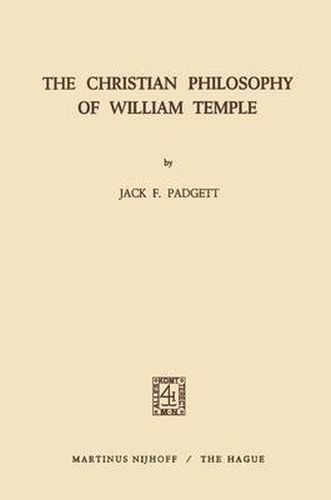Readings Newsletter
Become a Readings Member to make your shopping experience even easier.
Sign in or sign up for free!
You’re not far away from qualifying for FREE standard shipping within Australia
You’ve qualified for FREE standard shipping within Australia
The cart is loading…






This title is printed to order. This book may have been self-published. If so, we cannot guarantee the quality of the content. In the main most books will have gone through the editing process however some may not. We therefore suggest that you be aware of this before ordering this book. If in doubt check either the author or publisher’s details as we are unable to accept any returns unless they are faulty. Please contact us if you have any questions.
A. PURPOSE AND PLAN William Temple was trained as a philosopher and lectured on phi losophy at Oxford (1904), but his concern for labor, education, journalism, and the Church of England led him away from philosophy as a profession. Enthroned in 1942 as Archbishop of Canterbury, Temple persisted in applying his Christian position to the solution of the problems of the day. He will be remembered for his contributions in many areas of life and thought: his work in the ecumenical movement, and his writings in theology and social ethics attest to the variety and depth of his concern, but of special significance is his contribution toward the construction of a distinctly Christian philosophy relevant to the twentieth century. Although Temple did not work out a systematic formulation of his Christian philosophy, the bases for a Christian philosophy are never theless evident in his position. It is the purpose of the present work to enter sympathetically and critically into the major facets of Temple’s position and to weave together, as far as is legitimate, the separate strands of his thought into a meaningful, even if not a completely unified, Christian philosophy. The intent is not simply to present Temple’s conclusions on a variety of philosophical and theological issues; rather, Temple’s position is developed systematically, and the arguments for the conclusions at which he arrived are carefully ex pounded.
$9.00 standard shipping within Australia
FREE standard shipping within Australia for orders over $100.00
Express & International shipping calculated at checkout
This title is printed to order. This book may have been self-published. If so, we cannot guarantee the quality of the content. In the main most books will have gone through the editing process however some may not. We therefore suggest that you be aware of this before ordering this book. If in doubt check either the author or publisher’s details as we are unable to accept any returns unless they are faulty. Please contact us if you have any questions.
A. PURPOSE AND PLAN William Temple was trained as a philosopher and lectured on phi losophy at Oxford (1904), but his concern for labor, education, journalism, and the Church of England led him away from philosophy as a profession. Enthroned in 1942 as Archbishop of Canterbury, Temple persisted in applying his Christian position to the solution of the problems of the day. He will be remembered for his contributions in many areas of life and thought: his work in the ecumenical movement, and his writings in theology and social ethics attest to the variety and depth of his concern, but of special significance is his contribution toward the construction of a distinctly Christian philosophy relevant to the twentieth century. Although Temple did not work out a systematic formulation of his Christian philosophy, the bases for a Christian philosophy are never theless evident in his position. It is the purpose of the present work to enter sympathetically and critically into the major facets of Temple’s position and to weave together, as far as is legitimate, the separate strands of his thought into a meaningful, even if not a completely unified, Christian philosophy. The intent is not simply to present Temple’s conclusions on a variety of philosophical and theological issues; rather, Temple’s position is developed systematically, and the arguments for the conclusions at which he arrived are carefully ex pounded.